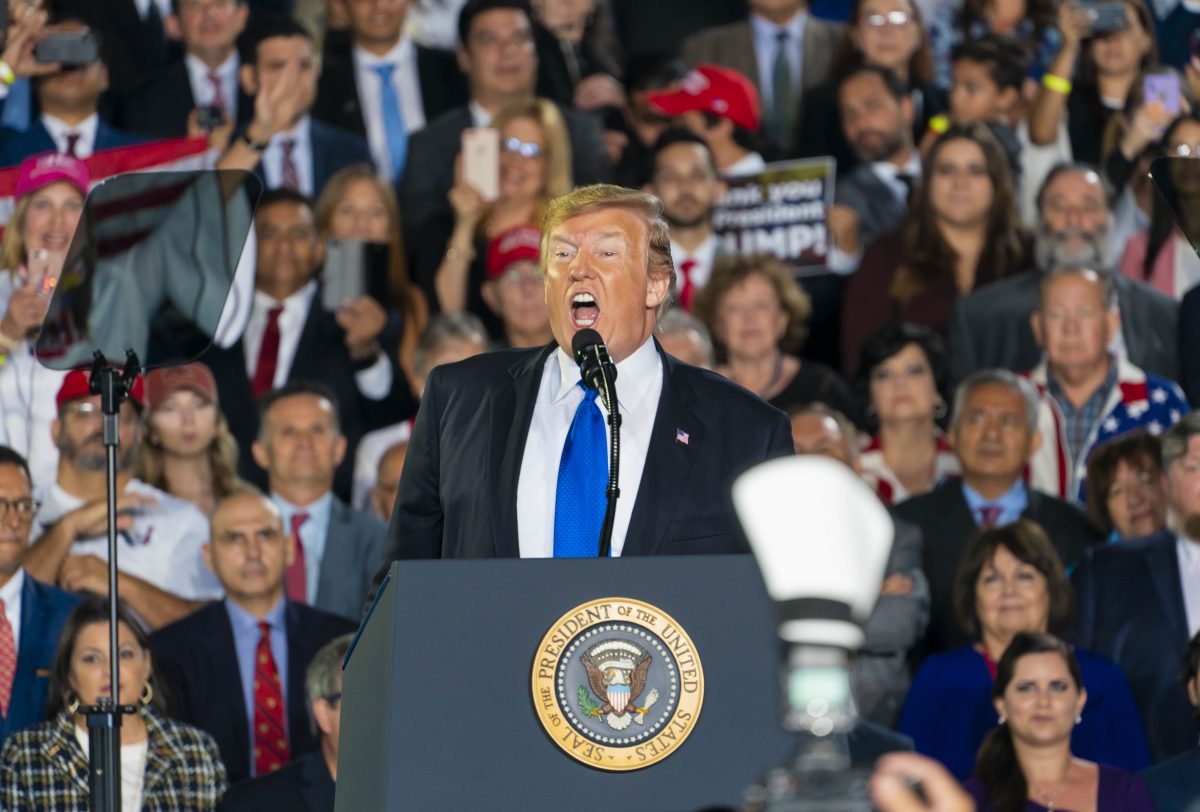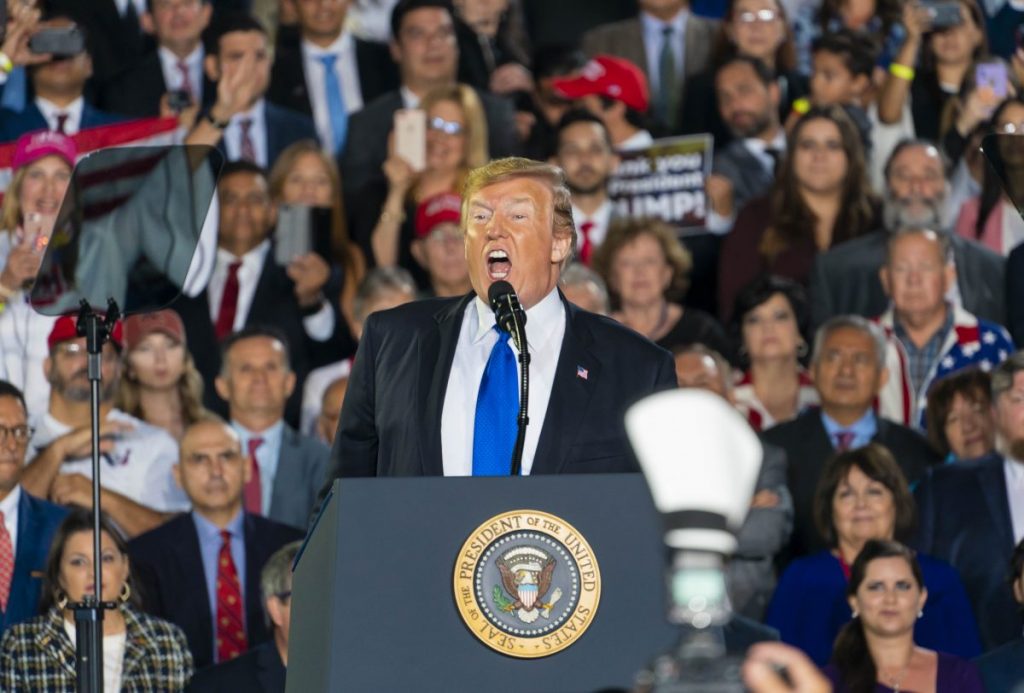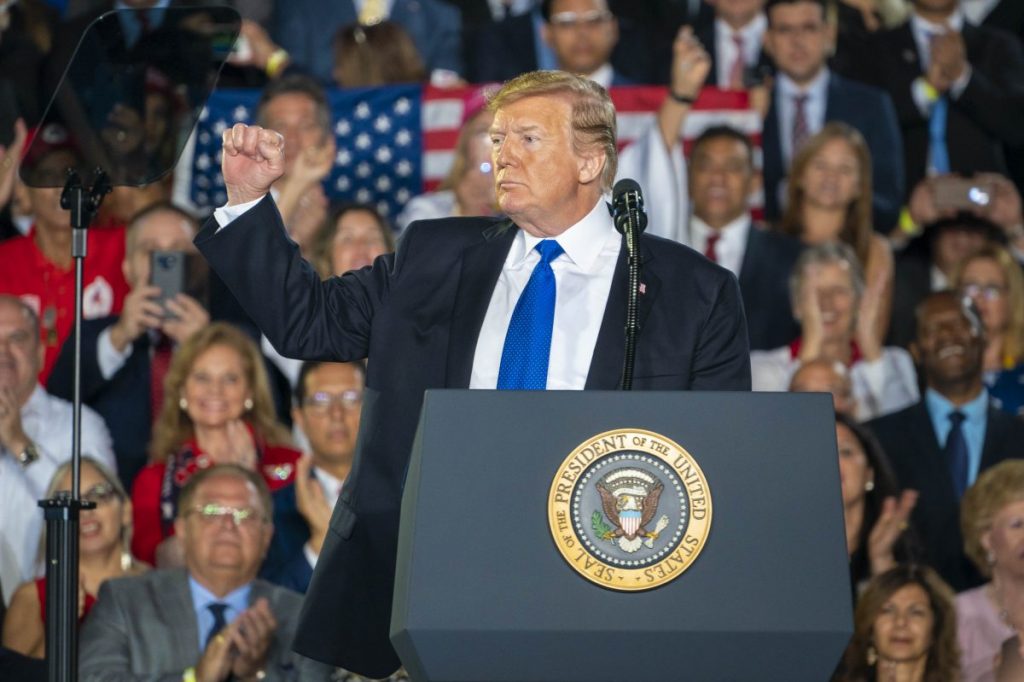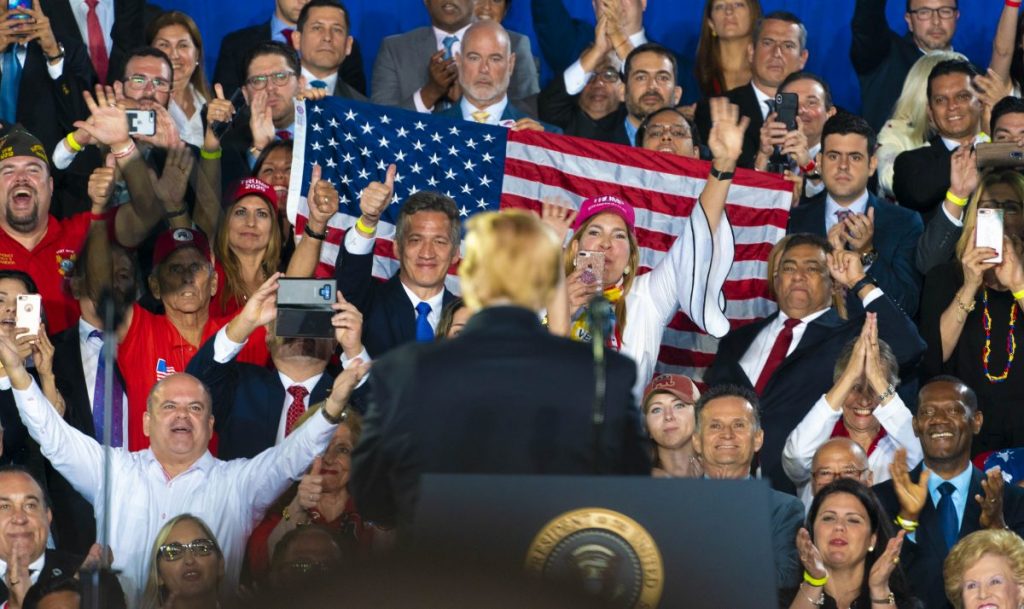
University of Miami architecture student Andrey Nash was on the treadmill at the wellness center when the word “impeachment” jumped out of one of the television screens in front of him.
Nash, a Democrat, said he was stunned but also “kind of excited” to hear about the news. However, his excitement soon diminished.
“He’s gonna fight it,” Nash said, dismayed at the thought of Donald Trump remaining in power.
But not everyone had the same reaction.
Sophomore finance major Gustavo Alexanian is a registered Republican and a passionate Trump supporter. He called the impeachment inquiry “another sad attempt to take down Trump.”

Varying viewpoints sprung up around UM’s campus last week after Speaker of the House Nancy Pelosi announced that House Democrats would move forward with an official impeachment inquiry against Trump. The inquiry follows the release of a whistleblower complaint, which accused the president of pressuring the Ukrainian president to investigate now-debunked corruption claims against vice president Joe Biden and his son, Hunter.
In response to the report, the White House released an official transcript of the phone call between Trump and Ukrainian president Volodymyr Zelensky. The transcript, which did not contain any classified information, had been stored on a secret server.
In the call, Trump tells Zelensky, “I would like you to do us a favor,” and asked him to work with Attorney General William Barr and Trump’s lawyer, Rudy Giuliani, in investigating Joe Biden, who could be running against Trump in the 2020 presidential election.
Trump also reminded Zelensky that the United States has done a lot in the past to help Ukraine, which many Democrats say insinuates an illegal quid-pro-quo request.
Should Trump be impeached?
While some members of the UM community say the transcript is evidence of Trump abusing his presidential power, others say it doesn’t prove any wrongdoing.
“I don’t think we have enough information yet on whether impeachment is a necessary step or not,” said Micaela Stoner, the president of the UM College Republicans. “I don’t know if there is a quid pro quo or not, and if there is none, I will not be supporting impeachment.”
Alexanian agreed, saying, “There is nothing that anyone has that would be a strong enough case for impeachment.”
But others support the impeachment proceedings, including Democrat Redmond Willis, a senior majoring in political science and economics. Willis said Trump should be called out for his actions during the phone call with Zelensky.
“I believe that is a clear case of corruption and involving outside parties to undermine the very democracy that the U.S. strives to uphold,” he said.
Sam Terilli, a lawyer and the chairman of the Department Journalism and Media Management, said although he needs more information to decide whether or not he supports impeachment, Trump’s words to the president of Ukraine were “very troubling.”
Terilli said he has no doubt that a formal impeachment inquiry is not only appropriate but necessary. If Congress walked away from this controversy without getting to the bottom of what the president tried to do, it would be a disservice to the American people, he said.
“The American public is entitled to the facts,” Terilli said. “This is not some silly reality television show, and the president doesn’t get to say or do whatever he wants– directly or by implication.”
Alexia Lucas, a junior premedical student from Canada, said she supports impeachment because Trump’s presidency “has been extremely compromised on multiple occasions.”
“This situation in particular seems unrecoverable,” she said in reference to the phone call between Trump and Zelensky. “How can a country put faith and leadership in someone who has done something so suspicious?”
Will impeachment be a success?
However, for some people, the question of whether or not Trump should be impeached is secondary to another question: Will impeachment succeed in removing the president from office?
Sy Lam, a senior legal studies major who identifies as a moderate Republican, said he doesn’t think so.
“It’s definitely a symbolic movement as of right now,” he said. “I don’t think the Senate will remove him.”
As of Monday afternoon, 224 of the 235 Democrats in the blue-controlled House of Representatives supported impeachment proceedings, but the Senate maintains a Republican majority. In order for Trump to be removed from office, a supermajority of the Senate would have to find the president guilty of “high crimes and misdemeanors.”
But Terilli said politicians should not be focusing on party lines. Instead, he urged them to realize the real issue: “a president who doesn’t seem to care about the rules.”
“The time has long since come for everyone in the Senate to put partisanship aside and think about the welfare of our democracy,” said Terilli, who refers to himself as an Independent. “This doesn’t mean that the Democrats are always above crass partisanship, but the issue right now is not the Democrats.”
However, others disagreed, saying the Democrats are more of a problem than Trump.
Professor of sociology Roger Dunham said this inquiry is just another example of Democrats trying and failing to eject Trump from office.
“I think all of this ‘get Trump’ movement and activities have and will continue to discredit the Democrat party,” Dunham said. “However, it obviously plays well to the ‘anti-Trumpers,’ many of whom have a very superficial understanding of the conflict going on and just want to overturn the 2016 election and get Trump out.”
Pranav Chugh, a senior majoring in political science, agreed that the inquiry is a waste of time. Rather than a constructive investigation, he said he thinks the investigation will turn into a “political witch hunt.”
Trump expressed similar concerns via Twitter, calling the inquiry “presidential harassment” and writing, “There has been no president in the history of our country who has been treated so badly as I have.”
Rather than further alienating Republican voters, Chugh said the Democrats would be better off focusing on their 2020 candidate.
“Nothing that the president says or does is going to change anyone’s mind,” said Chugh, who doesn’t identify with any particular party. “The people who hate him will continue to hate him while the people who support him will continue to do so.”
Gabriela Coteron, a first-year law student and a registered Democrat, said impeachment would be a “relief” but agreed that the inquiry will not affect Trump’s campaign for re-election. She pointed out that Trump has been associated with numerous scandals, none of which ended his campaign or presidency.
“I think at this point in America’s history, he is the candidate to beat,” Coteron said. “The problem is I don’t think there is enough moral obligation in this country right now to get him out.”
Effects of impeachment
Other students and faculty worry about the long-term impacts of impeachment proceedings. Many say that if Trump was removed from office, Vice President Mike Pence would not offer a better alternative.
Laura Florez, a senior exercise and physiology major, said a Pence presidency could cause fear among members of the LGBTQ+ community, as the evangelical Christian holds notoriously anti-gay viewpoints.
“We can be left in a state of uncertainty because of what’s to come next,” Florez said. “Who knows what can come with Pence and that type of power?”
Chugh agreed that Pence would be a worse president than Trump.
“I can’t imagine a world where Mike Pence as president is a step up,” he said.
Neha Reddy, a junior biochemistry major, said she’d be happy if the inquiry were successful but worries that Trump’s impeachment would create “more commotion in our government” and intensify existing political divides.
Michael Werner, a registered Republican and an accounting professor at the Miami Business School, has a different concern: the economy. A power-shift could hurt America’s economy, Werner said, especially since many people perceive Trump to be the main contributor to its success.
“Even without a tangible underlying problem with the economy, the media hype and negative news of an American president being removed from office and the fear of losing what many feel is a driving force for business will negatively impact commerce and the economy,” Werner said.
But regardless of its outcome, many people say the impeachment inquiry is essential for the sake of America’s democratic integrity. Paul Driscoll, an expert in media law and the vice dean of academic affairs at the School of Communication, said, “It’s about time that the country realizes the extent of Donald Trump’s criminal actions. Nancy Pelosi said it herself: ‘Nobody is above the law.’”
Victoria Anzola, Jacqueline Bajric, Sydney Boyo, Joseph Cid, Jayda Graham, Jaime Harn, Gabrielle Lord, Daniela Perez, Isabel Tragos, MacKenzie Trexler, Joanna Ugo, Madelyn Werder and Greta West contributed to this report.
What is impeachment?
Impeachment is a multistep process that goes beyond just the articles of impeachment. It is important to understand that impeachment itself is not removal from office. Articles of impeachment are a formal collection of charges drafted to initiate the impeachment process. The U.S. House of Representatives is responsible for drafting these articles.
The House must first vote on and pass the articles with a simple majority vote. The defendant at this point has been impeached. No formal action is further taken in the House. It is then the responsibility of the Senate to hold a trial and convict the defendant, which cannot happen without a supermajority vote, which is generally considered to be a two-thirds majority.
The current U.S. House of Representatives holds a majority Democratic body of 235 Democrats and 198 Republicans. A majority vote in the House would require 218 votes and a supermajority in the Senate would require 67 out of 100 votes.
Although there have been efforts to impeach four presidents, including John Tyler and Richard Nixon, only two have been impeached throughout U.S. history: Andrew Johnson in 1868 and Bill Clinton in 1998. Neither impeached president was convicted by the Senate. Nixon resigned before proceedings began.
The Constitution only vaguely includes “high crimes and misdemeanors” as impeachable offenses. The word “high” in this context refers to the office not the offense. The Harvard Law Review specifically highlights offenses that subvert the Constitution and “include an unforgivable abuse of the presidency.”
–Ines Eisenhour
What is a whistleblower?
House Speaker Nancy Pelosi’s call for impeachment proceedings was jump started by an anonymous individual known publicly as a whistleblower. Whistleblowers have been influencing politics since the beginning of our nation, often changing the course of history.
A whistleblower is a person who reports or exposes wrongdoing or illegal activity, usually in government institutions. Although whistleblowers are caught in the center of a political scandal, for the most part, they are legally protected. The Whistleblower Protection Act protects whistleblowers working for the federal government, and many protection programs exist in both the public and private sectors.
Like the whistleblower in this case, many individuals have caused a stir in national news. One of the most famous whistleblowers was former associate director of the Federal Bureau of Investigations, Mark Felt, who used the alias “Deep Throat” to report former president Nixon’s involvement in the 1972 Watergate Scandal.
Another well-known whistleblower is former White House employee and friend of Monica Lewinsky, Linda Tripp. Tripp exposed former president Bill Clinton’s affair with Lewinsky, revealing the president had lied under oath. The actions taken by both whistleblowers led to impeachment proceedings in Congress.
At this time, the whistleblower in the Trump-Ukraine scandal remains anonymous but has expressed interest in testifying against Trump before Congress.
–Amanda Gonzalez
Donna Shalala pivots on impeachment

When in comes to impeaching the president, Florida Congresswoman Donna Shalala, D-Florida, is on board. This marks a significant pivot for Shalala and her colleagues in Florida’s Democratic congressional delegation, many of who were recently undecided or opposed impeachment.
The shift in support comes after Speaker of the House Nancy Pelosi announced that she would open an impeachment inquiry following President Donald Trump’s recent talks with Ukrainian president Volodymyr Zelensky. Trump asked Zelensky to investigate Joe Biden and his son’s involvement in a Ukrainian gas company and allegedly withheld $250 million in aid unless his demands were met. Trump maintains that the phone call and the delay in aid were not connected.
In early September, Shalala told The Miami Hurricane that presidential impeachment would be a distraction from the more pressing issues.
“My lack of enthusiasm doesn’t mean that I don’t believe the president has done things that are impeachable offenses,” Shalala said. “But, it does mean that I’d like to keep my eye on the ball and get things done for the people in my district, for students, for young people and particularly for the most vulnerable people in our society.”
Shalala referenced Bill Clinton’s impeachment process, explaining that it overshadowed some of the administration’s achievements while also drawing focus away from other problems. However, Shalala is now one of the 224 Democrats who support impeachment, aligning her priorities with her party’s views.
Jaime Harn and Noor Khaled contributed to this report.
–Ben Estrada









